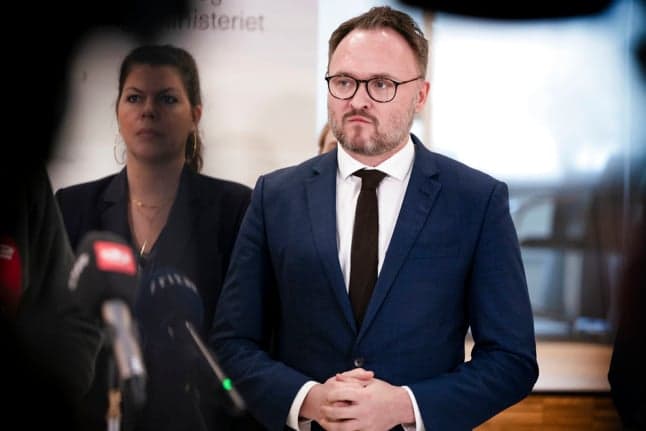Denmark to give 320,000 households money for heating bills

Around 320,000 households in Denmark are to be given money to help cover the costs of soaring heating bills after a majority in parliament backed spending on the issue.
Steep increases in energy prices over the last year have affected a large number of households in Denmark, and political parties have in recent weeks urged the government to respond and put forward proposals for how to tackle the problem.
“We think it’s fair that we give this helping hand because we’re in such a unique situation. We are not used to helping people pay these types of bills,” climate, energy and critical supplies minister Dan Jørgensen said at a briefing.
“We have not chosen, as others have proposed, to give a broad tax break to all Danes. That would result in us helping many Danes with a small amount. The effects of this need to be felt be the people who receive the cheques,” he said.
According to the agreement, which was presented on Friday, the government along with its traditional allies on the left wing, as well as the Christian Democrats, support a deal which spends around one billion kroner on one-off subsidies for households affected by high heating bills.
Around 320,000 households will receive 3,750 kroner under the scheme. Payouts will occur automatically, so eligible households do not need to go through an application process.
Conditions for receiving the support include the home being located in an area with district heating driven primarily by gas power plants, or the home having individual gas heating.
Households must have overall annual incomes under 550,000 kroner to qualify for the scheme.
The political agreement also provides for expedited replacement of individual gas heating systems. Spending on this will be 250 million kroner, which means the total value of the agreement is 1.25 billion kroner.
Conservative parties on Thursday evening withdrew from negotiations over a deal, saying the government was not prepared to spend enough and that too few households would therefore receive funds.
“We have left the negotiations because the amount that was proposed was too low. We wanted a model with a higher income threshold so normal families also get help,” Liberal (Venstre) party energy spokesperson Carsten Kissmeyer told news wire Ritzau.
Parties on the right wanted money saved by the government on sustainable energy subsidies – which have not been realised by energy companies due to their increased revenues resulting from high energy prices – to be diverted to the household benefits, to the total of four billion kroner.
Jørgensen said on Friday that this was not possible because those funds were tied in to other areas.
READ ALSO: Why some homes in Denmark are more affected by rocketing heating bills
Comments
See Also
Steep increases in energy prices over the last year have affected a large number of households in Denmark, and political parties have in recent weeks urged the government to respond and put forward proposals for how to tackle the problem.
“We think it’s fair that we give this helping hand because we’re in such a unique situation. We are not used to helping people pay these types of bills,” climate, energy and critical supplies minister Dan Jørgensen said at a briefing.
“We have not chosen, as others have proposed, to give a broad tax break to all Danes. That would result in us helping many Danes with a small amount. The effects of this need to be felt be the people who receive the cheques,” he said.
According to the agreement, which was presented on Friday, the government along with its traditional allies on the left wing, as well as the Christian Democrats, support a deal which spends around one billion kroner on one-off subsidies for households affected by high heating bills.
Around 320,000 households will receive 3,750 kroner under the scheme. Payouts will occur automatically, so eligible households do not need to go through an application process.
Conditions for receiving the support include the home being located in an area with district heating driven primarily by gas power plants, or the home having individual gas heating.
Households must have overall annual incomes under 550,000 kroner to qualify for the scheme.
The political agreement also provides for expedited replacement of individual gas heating systems. Spending on this will be 250 million kroner, which means the total value of the agreement is 1.25 billion kroner.
Conservative parties on Thursday evening withdrew from negotiations over a deal, saying the government was not prepared to spend enough and that too few households would therefore receive funds.
“We have left the negotiations because the amount that was proposed was too low. We wanted a model with a higher income threshold so normal families also get help,” Liberal (Venstre) party energy spokesperson Carsten Kissmeyer told news wire Ritzau.
Parties on the right wanted money saved by the government on sustainable energy subsidies – which have not been realised by energy companies due to their increased revenues resulting from high energy prices – to be diverted to the household benefits, to the total of four billion kroner.
Jørgensen said on Friday that this was not possible because those funds were tied in to other areas.
READ ALSO: Why some homes in Denmark are more affected by rocketing heating bills
Join the conversation in our comments section below. Share your own views and experience and if you have a question or suggestion for our journalists then email us at [email protected].
Please keep comments civil, constructive and on topic – and make sure to read our terms of use before getting involved.
Please log in here to leave a comment.